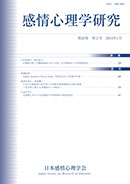巻号一覧

23 巻 (2015)
- 3 号 p. 97-
- 2 号 p. 59-
- 1 号 p. 1-
- Supplement 号 p. os01-
23 巻, 2 号
選択された号の論文の5件中1~5を表示しています
- |<
- <
- 1
- >
- >|
原著
-
白井 真理子, 鈴木 直人原稿種別: 原著
2016 年23 巻2 号 p. 59-67
発行日: 2016/01/30
公開日: 2016/04/12
ジャーナル フリーThis study examined differences of sadness elicited by six types of situation by using subjective ratings. The previous studies haven't clarified that physiological responses in sadness were uncertain compared with other emotions. These findings suggest one possibility that there are different types of sadness. In order to investigate this assumption, we created a questionnaire composed of descriptive terms to express sadness. The questionnaire was extracted three factors, “tear,” “chest ache,” and “powerless.” Using this, we also examined the time-course change of features of sadness based on six sadness-eliciting situations. Results showed two patterns of change as time progressed. Type 1 is that ratings of three factors maintain high value along time change. This pattern is elicited by situations such as loss, personal injury or disease and loneliness. Type 2 is that ratings decreased over time. This pattern is elicited by situations like unable to achieve a goal, romantic breakup and family friction. In conclusion, considering temporal change, this study revealed two different features showed in three factors suggesting the possibility that different types of sadness were reflected in subjective ratings.抄録全体を表示PDF形式でダウンロード (404K)
資料
-
髙橋 亜希原稿種別: 資料
2016 年23 巻2 号 p. 68-77
発行日: 2016/01/30
公開日: 2016/04/12
ジャーナル フリーThe present study developed a Japanese version of the Highly Sensitive Person Scale (HSPS) which was first devised by Aron and Aron (1997). The basis of the scale was to measure individual differences in sensory-processing sensitivity (SPS). In Study 1, the author identified 27 items of Japanese version (HSPS-J) after repeated bilateral translations and data collected from 324 college students exhibiting sufficient reliability of the scale. In Study 2, 369 undergraduates answered HSPS-J and other questionnaires to measure personality dimensions. 19 items remained after excluding the items with low factor loading scores. Factor analysis demonstrated 19 items of HSPS-J (HSPS-J19) having a three-factored structure of Low Sensory Threshold, Ease of Excitation, and Aesthetic Sensitivity. Adequate internal consistency was demonstrated by Cronbach's alpha, and its validity was also shown in terms of the relationship with personality dimensions of Neuroticism and Introversion.抄録全体を表示PDF形式でダウンロード (388K) -
箕浦 有希久, 成田 健一原稿種別: 資料
2016 年23 巻2 号 p. 78-86
発行日: 2016/01/30
公開日: 2016/04/12
ジャーナル フリーThe purpose of this study is to develop a scale for measuring state self-esteem using the Two-Item Self-Esteem scale (TISE) and to investigate its validity. State self-esteem, positive/negative experience of events and moods were rated once a day for 1 week in a Web-based surveys of adults. Concurrent validity was demonstrated by positive correlations between the TISE and pre-existing state self-esteem scale. Construct validity was established by correlations between the TISE and participants' both experience of events and perceived moods. The results indicate that state self-esteem increased in relationship to positive events and mood, and decreased in relationship to negative events and mood. The findings indicate that the state version of the TISE developed in this study is a valid tool for measuring state self-esteem.抄録全体を表示PDF形式でダウンロード (378K) -
大島 みずき原稿種別: 資料
2016 年23 巻2 号 p. 87-94
発行日: 2016/01/30
公開日: 2016/04/12
ジャーナル フリーWhen do we begin to feel unpleasantness about being unable to reciprocate for help received? Do the reasons for unpleasant feelings when unable to reciprocate differ according to one's age and who provided the help? This study asked 2nd grade (n=121) and 4th grade (n=130) elementary school children on a questionnaire to estimate the importance of the reciprocity, the recognition of probability of reciprocity, unpleasant feelings when reciprocity is not accomplished, and the anger of the person whose help was not reciprocated. In this experiment, there were two conditions of help: from friends and from parents. When a parent had helped, the 2nd graders' unpleasant feelings was less than it was for 4th graders. When the helper was a friend, there were no differences in unpleasant feelings between 2nd and 4th graders. In addition, unpleasant feelings among 2nd graders was related to the possibility of helper's anger when reciprocity was not unaccomplished. Among 4th graders, however, the unpleasant feelings in the context of unaccomplished reciprocity were related to the importance of reciprocity and the recognition of probability of reciprocity. The study suggests that children come from the 4th grade to feel unpleasantly when reciprocity is not fulfilled, based on the norm of reciprocity.抄録全体を表示PDF形式でダウンロード (319K)
訂正
-
2016 年23 巻2 号 p. 95
発行日: 2016/01/30
公開日: 2016/04/12
ジャーナル フリーPDF形式でダウンロード (47K)
- |<
- <
- 1
- >
- >|